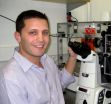(Press-News.org) New research in human volunteers has shown that molecular changes to our genes, known as epigenetic marks, are driven mainly by ageing but are also affected by what we eat.
The study showed that whilst age had the biggest effects on these molecular changes, selenium and vitamin D status reduced the accumulation of epigenetic changes, and high blood folate and obesity increased them. These findings support the idea that healthy ageing is affected by what we eat.
Researchers from the Institute of Food Research led by Dr Nigel Belshaw, working with Prof John Mathers and colleagues from Newcastle University, examined the cells lining the gut wall from volunteers attending colonoscopy clinic. The Institute of Food Research is strategically funded the Biotechnology and Biological Sciences Research Council and this study was also funded by the Food Standards Agency.
The study volunteers were free from cancer or inflammatory bowel disease and consumed their usual diet without any supplements. The researchers looked for specific epigenetic modifications of the volunteers' genes that have been associated with the earliest signs of the onset of bowel cancer – an age-related disease. These epigenetic marks, known as DNA methylation, do not alter the genetic code but affect whether the genes are turned on or off. These methylation marks are transmitted when cells divide, and some have been associated with the development of cancer.
The investigators studied the relationship between the occurrence of these epigenetic marks at genes known to be affected in cancer, and factors including the volunteers' age, sex, body size and the levels of some nutrients in the volunteers' blood. The biggest influence on gene methylation was age. This fits with the fact that the biggest risk factor for bowel cancer is age, with risk increasing exponentially over 50 years old.
The findings, published in the journal Aging Cell, showed that men tended to have a higher frequency of these epigenetic changes than women, which is consistent with men being at a greater risk of bowel cancer. Volunteers with higher vitamin D status tended to show lower levels of methylation, and a similar effect was observed for selenium status. Again, this is consistent with the known links between higher vitamin D and selenium and reduced bowel cancer risk.
The B vitamin folate is essential for health, but in this study, high folate status was associated with increased levels of epigenetic changes linked with bowel cancer. These findings are consistent with some epidemiological studies suggesting that excessive folate intakes may increase risk in some people. The researchers intend to investigate the mechanism for the observed effect of folate on DNA methylation in a follow-up study.
Obesity is also a risk factor for bowel cancer. This study found relationships between body size (height, weight and waist circumference) and epigenetic changes. How excess body weight induces these epigenetic changes, and the consequences for gut health, are currently being investigated at IFR and in Newcastle University.
In summary, the results of this study support the hypothesis that ageing affects the epigenetic status of some genes and that these effects can be modulated by diet and body fatness.
INFORMATION:
Reference:
Nutritional factors and gender influence age-related DNA methylation in the human rectal mucosa, Aging Cell, doi: 10.1111/acel.12030
New evidence for epigenetic effects of diet on healthy aging
2012-12-06
ELSE PRESS RELEASES FROM THIS DATE:
New understanding can lead to srategies for dealing with neurodegenerative diseases
2012-12-06
Jerusalem Dec. 6, 2012 – A new understanding of what takes place on the cellular level during the development of neurodegenerative diseases, such as Parkinson's, Alzheimer's, ALS and Huntington's diseases, offers promise towards possible new strategies for combating such diseases, say Hebrew University of Jerusalem researchers.
Neurodegenerative conditions result from an impairment of motor function or cognitive function or both. This impairment results from degeneration in the particular area of the brain responsible for those functions.
Although these neurodegenerative ...
'Releasing' people from Catholic guilt increases generosity towards church, research shows
2012-12-06
People who recall being absolved of their sins, are more likely to donate money to the church, according to research published today in the journal Religion, Brain and Behavior.
Researchers from Royal Holloway and the University of Oxford assigned participants two memory tasks. In the first, they were asked to privately recall a sin that they had committed in the past, while in the second, they recalled attending confession for this sin or imagined doing so, if they had not confessed in reality.
Each participant was also given an opportunity to donate to a local Catholic ...
My microbes
2012-12-06
We all have E.coli bacteria in our gut but each of us carries a version that is genetically slightly different. The same can be said of most gut microbes: our own gut metagenome, that is the sum of all the genomes of all our gut microbes, appears to be really specific to each of us, and to remain stable over time. For the first time, researchers from the European Molecular Biology Laboratory (EMBL) have studied this metagenome at such a high resolution that individual mutations in the various strains could be analysed. Their findings, published today in Nature, could have ...
Insight into DNA reprogramming during egg and sperm cell development
2012-12-06
Scientists at the Babraham Institute have gained a new understanding of when and how the DNA in developing egg and sperm cells is 'reset', in preparation for making a new embryo. It is well known that small chemical groups can be added to DNA to alter gene activity, these modifications to the DNA are acquired during development in the womb and throughout adult life and can arise from changes in environment. Most of these modifications are removed in immature egg and sperm cells to 'reset' the DNA and to erase any 'environmental memory', but some remain. Decoding this reprogramming ...
Cocktail boosts immune cells in fighting cancer
2012-12-06
Fighting cancer using the body's own defense system is a promising treatment approach. Immune therapies have even become clinical routine in treating a few cancers such as malignant melanoma and prostate cancer. Natural killer cells (or NK cells) are considered to be particularly suitable weapons against cancer. They are part of the innate immune system and respond to a wide range of cancer cells of diverse origin. Moreover, NK cells also kill tumor cells that have lost a specific target and go unnoticed by other immune cells.
"The big problem in using NK cells for therapy ...
Warm sea water is melting Antarctic glaciers
2012-12-06
The ice sheet in West Antarctica is melting faster than expected. New observations published by oceanographers from the University of Gothenburg and the US may improve our ability to predict future changes in ice sheet mass. The study was recently published in the journal Nature Geoscience.
A reduction of the ice sheets in Antarctica and Greenland will affect the water levels of the world's oceans.
It is therefore problematic that we currently have insufficient knowledge about the ocean circulation near large glaciers in West Antarctica. This means that researchers ...
Feeling disgust may enhance our ability to detect impurities
2012-12-06
Disgust – it's an emotion we experience when we encounter things that are dirty, impure, or otherwise contaminated. From an evolutionary standpoint, experiencing the intense, visceral sense of revulsion that comes with disgust presumably helps us to avoid contaminants that can make us sick or even kill us. But new research suggests that disgust not only helps us to avoid impurities, it may also make us better able to see them.
If something looks dirty and disgusting, we typically assume it's contaminated in some way; when something is white, however, we are more likely ...
Researchers investigate impacts of climate change on rare tropical plants
2012-12-06
Research led by the University of York has found that the impacts of climate change on rare plants in tropical mountains will vary considerably from site to site and from species to species.
While some species will react to climate change by moving upslope, others will move downslope, driven by changes in seasonality and water availability. The researchers believe that this predicted variation, together with the long-term isolation and relative climatic stability of the mountains, may shed light on historical processes behind current patterns of biodiversity.
The study, ...
How cold will a winter be in 2 years?
2012-12-06
How well are the most important climate models able to predict the weather conditions for the coming year or even the next decade? The Potsdam scientists Dr. Dörthe Handorf and Prof. Dr. Klaus Dethloff from the Alfred Wegener Institute for Polar and Marine Research in the Helmholtz Association (AWI) have evaluated 23 climate models and published their results in the current issue of the international scientific journal Tellus A. Their conclusion: there is still a long way to go before reliable regional predictions can be made on seasonal to decadal time scales. None of ...
Rapid eye movements significantly delayed in people with glaucoma
2012-12-06
TORONTO, DEC. 6, 2012—Rapid eye movements are significantly delayed in patients with glaucoma, even those in the early stages of the disease, research has found.
The findings, led by Dr. Neeru Gupta, an ophthalmologist at St. Michael's Hospital, may shed new light on why glaucoma patients are at increased risk for falls and car accidents. Glaucoma is the leading cause of irreversible blindness.
Rapid (or saccadic) eye movements are the quick, simultaneous movements of both eyes in the same direction. They are involved in a myriad of everyday activities, from reading to ...

